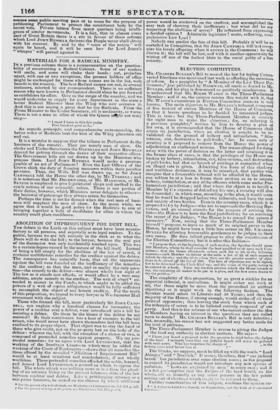ABOLITION OF IMPRISONMENT FOR DEBT BILL. THE debate in the
Lords on this subject must have been unsatis- factory to all persons, and especially so to legal readers. To the public, because we are left entirely in the dark as to what the Peers will do with the bill ; to the lawyer, because the real gist of the discussion was only inchlentally touched upon. This was to a certain degree caused by the nature of the bill itself. Instead of being a bill simply for the abolition of the law of arrest, it contains multifarious remedies for the creditor against the debtor. The consequence has naturally been, that all the arguments against the bill were founded on the inefficiency of the remedies to the creditor; so that the main, and in reality the only ques- tion—the remedy to the debtor—was almost wholly lost sight of. The law as it stands now affords, or would afford by a very easy addition, ample remedy to the creditor. The writ of elegit* ex- tended to money in the Funds, to which ought to be added the powers of a writ of copies uttogalum,t would be fully sufficient to accomplish the object of any honest creditor. For the truth of this proposition, we appeal to every lawyer in Westminster Hull conversant with the subject. Those who framed the bill, more particularly Sir JOHN CAMP- BELL, can explain why a hundred clauses for increasing the power of a creditor over a debtor, were introduced into a bill for assisting a debtor. On them be the blame if the debtor be not assisted! By their contrivance has a host of enemies to the bill arisen, who would never have shown themselves had the bill been confined to its proper object. That object was to stay the band of those who give credit, not on the property but on the body of the debtor: whereas the bill, with the exception of a clause or two, is composed of pretended remedies against property. We say pre- tended remedies; for we agree with Lord LYNDHURST, that the working of the Insolvent Court—to which-may be added the woi king of the Court of Bankruptcy—shows that all remedies like those offered by the so-called "Abolition of Imprisonment Bill" would be at least vexatious arid unsatisfactory, if not wholly worthless. These pretended remedies afforded the noble, learned, and honest Lord LYNDFIVII.sT, a ground on which to oppose the bill. The whole attack e as nothing more or less than the plead- ing of an attorney living on the preseut infamous state of the law between creditor and debtor. Like a pettifoeging attorney or a prius barrister, lie seized on the clauses by whish • For the powers of a writ of elegit. see Blackstone's Corn tnentzWes, Vol. III. p.417. Fur the pn,ers or a calias uti,;;Mum, so: Mae libtow, Vol. power would. be eonferre.a on the creditor, and accomplished the easy task of showing their inefficiency : but what did he say respecting the abolition of arrest? He refrained from expressing a decided opinion! Admirable legislator ! acute, reflecting, com- prehensive Law Lord ! Nobody can predict the fate of this bill. Probably it will be so curtailed in Committee, that Sir JOHN CAMPBELL will'nut recog. nize his lovely offspring when it arrives in the Commons ; he will disown it ; the bill will be lost, and with it another opportunity for wiping off one of the foulest blots in the social polity of a free country.


























 Previous page
Previous page